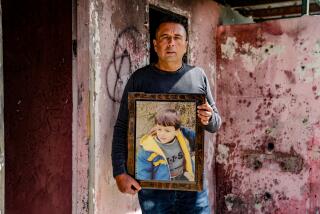BOOK REVIEW : A Puzzling Search for a Prophetic Destiny : THE HEALER <i> by Aharon Appelfeld translated from Hebrew by Jeffrey M. Green</i> Grove Weidenfeld $16.95, 184 pages
- Share via
“In the autumn they arrived. The way had been long, exhausting, and toward the end it had been beyond the mother’s strength.”
So begins Aharon Appelfeld’s fable “The Healer,” about the great sea change that overtook Central Europe’s Jews in the 1930s; a tidal wave that would bear millions to death and others to salvation in Israel. It has an evident biblical cast. Oddly, what it suggests is the Nativity story, particularly as we read of a strangely distanced father and of the inn at which the family dismounts.
It is a puzzle why this Christian echo should be sounded in a story of Viennese Jews, whose secure bourgeois status, attained after centuries of struggle, was shattered almost in a day. Appelfeld’s story is full of such puzzles, and yet its gist is clear. If anything, it is too clear. Perhaps directness bordering on the obvious, in a writer of such artfulness, is its ultimate puzzle.
Felix, a prosperous businessman, has arrived with his family, after a terrible three-day journey by train and cart, in a remote village in the Carpathian Mountains. It is inhabited entirely by Jews; its distinction is the presence of an old Talmudic scholar with a reputation as a healer.
Felix is angry, and his anger masks a deep unsettlement. He is a believer in science, in Western civilization and--like many European Jews at the time--in the possibility of full integration. But his beloved daughter, Helga, a pianist, has fallen into a wasting depression that the doctors cannot cure. His wife, Henrietta, has heard of the healer and stands up out of her accustomed submissiveness to insist on visiting him.
Felix acquiesces, but the journey and the months that he spends in the village are a kind of annihilation. In Vienna, he was the family’s patriarchal center; here, as Henrietta and Helga patiently follow the healer’s injunction to learn Hebrew and study the Bible, he feels irrelevant and estranged.
More deeply, though, he feels the overthrow of all his Western values, of the civilized assimilation that is his life. “If a man leaves his home and journeys into the desert he is guilty,” he protests, as they arrive in this very different Jewish world of peasants and foresters. And the recourse to a rabbinical healer is pure scandal to him, evoking an ancestral legacy that stands for separation from his European world.
“We will not pray on orders,” he objects. But neither his wife nor his daughter listens. They become remote, and Felix drifts into a kind of hallucinatory depression, one that colors the dreamlike tone, arbitrary jumps and disjointed connections with which the story is told.
Such a style suggests, sometimes movingly, the imminent extinction of both a life and a way of life. Felix’s confused perceptions, in their way, are a kind of “Death of Ivan Illich.” But Appelfeld can be coarse and careless in his use of it; to write of disconnection requires the finest of fictional connections. Part of the coarseness may be due to an unappealing translation.
In any case, the thrust of Appelfeld’s parable is plain and powerful. The family’s exodus, the search for a prophetic destiny that is the contrary of assimilation, the village of Jews who work the soil--all these prefigure the land of Israel as the alternative to destruction.
Where Appelfeld shows his strength is in his avoidance of sentimentality. By centering the story in Felix’s confused perception, he suggests that salvation has its own desolateness. The village, the healer, and Helga’s and Henrietta’s conversion have no particular allure. On the contrary, if there is any focus of sympathy, it is upon Felix’s dying dream of civilization.
That it is indeed dying is made clear in the book’s last and best section. Traveling first-class on the train back to Vienna--Helga and Henrietta remain in the village--Felix is back in his European comforts. But the hospitable dining-car waitress makes anti-Semitic remarks as she serves an excellent meal, and a police inspector harasses him for being Jewish. There is nothing happy about salvation: All it does is save.
Next: Elaine Kendall reviews “A Place I’ve Never Been” by David Leavitt (Viking).
More to Read
Sign up for our Book Club newsletter
Get the latest news, events and more from the Los Angeles Times Book Club, and help us get L.A. reading and talking.
You may occasionally receive promotional content from the Los Angeles Times.










